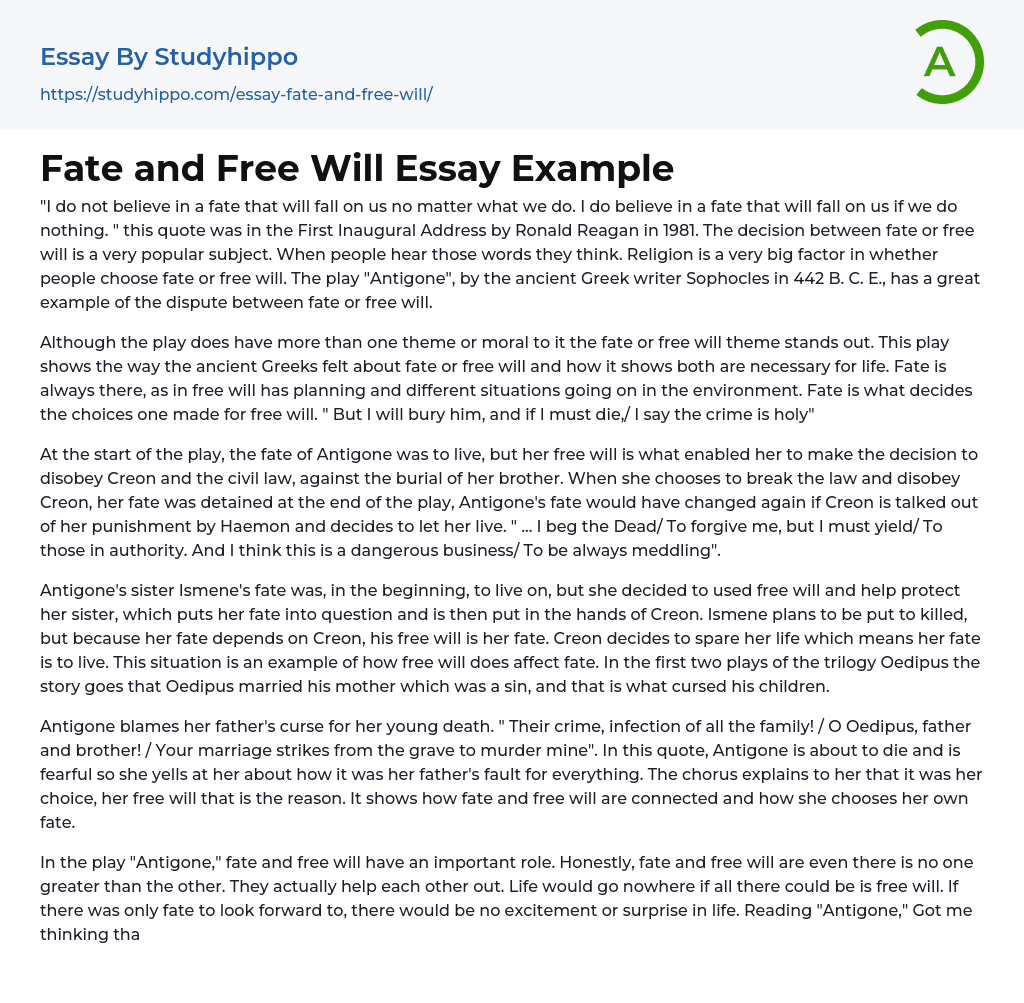"Our destiny is not predetermined and will only be realized through our actions," stated Ronald Reagan during his First Inaugural Address in 1981. However, if we opt to remain idle, our destiny will still unfold.
Religion often sparks discussions on the topic of fate versus free will. A renowned ancient Greek playwright named Sophocles explored this theme in his play "Antigone," written in 442 B.C.
E., exemplifies the debate between fate and free will, which serves as the predominant theme of the play. Though it encompasses multiple themes and morals, the notion of fate versus free will is particularly notable. This play depicts the ancient Greeks' perspective on fate and free will, highlighting the importance of both in life. Fate is always present, just as free will involves planning and navigating v
...arious circumstances in one's surroundings. Fate ultimately determines the choices made through free will. "But I will bury him, and if I must die,/ I say the crime is holy." Initially, Antigone's fate dictates that she should live; however, her exercise of free will leads her to defy Creon and civil law by burying her brother.
In the play, Antigone, when she chooses to disobey Creon and break the law, her fate is uncertain. If Creon is convinced by Haemon to spare her punishment, her fate would have changed once again. She states, " ... I beg the Dead/ To forgive me, but I must yield/ To those in authority. And I think this is a dangerous business/ To be always meddling". Initially, Ismene's fate was to live on, but she decides to exercise her free will and help protect her sister. This decision puts her fat
in question and ultimately relies on Creon. Ismene plans to be killed, but her fate is dependent on Creon's free will.
Creon's decision to spare Antigone's life signifies that she will be able to live on, demonstrating the impact of free will on one's fate. This situation echoes the events in the first two plays of the Oedipus trilogy, where Oedipus committed a sinful act by marrying his mother, resulting in a curse that affected his children. Antigone holds her father responsible for her untimely demise, attributing her tragic fate to the familial consequences of his forbidden union. As Antigone faces imminent death, she expresses her fear and places blame on her father, exclaiming, "Their crime, infection of all the family! O Oedipus, father and brother! Your marriage strikes from the grave to murder mine."
The chorus conveys to her that her decision and freedom of choice are what caused the outcome. It demonstrates the interconnection between destiny and personal agency, as well as her ability to determine her own destiny. In the play "Antigone," both destiny and free will play significant roles. Truthfully, neither destiny nor free will can be considered superior to the other. In fact, they mutually support one another.
Life would lack direction if it consisted solely of free will, and it would lack anticipation and wonder if it were solely determined by fate. After reading "Antigone," it made me realize that both elements must coexist. If we were to have only fate or only free will, the result would be a disastrous world.
- Acceptance essays
- Age Of Enlightenment essays
- Child Observation essays
- Confucianism essays
- Conscience essays
- Critical Reflection essays
- Destiny essays
- Determinism essays
- Empiricism essays
- Environmentalism essays
- Epistemology essays
- Ethics essays
- Ethos essays
- Existence essays
- Existentialism essays
- Fate essays
- Free Will essays
- Functionalism essays
- Future essays
- Good And Evil essays
- Human Nature essays
- Individualism essays
- Meaning Of Life essays
- Metaphysics essays
- Natural Law essays
- Personal Philosophy essays
- Philosophers essays
- Philosophy Of Life essays
- Political Philosophy essays
- Pragmatism essays
- Reality essays
- Relativism essays
- Teaching Philosophy essays
- Time essays
- Transcendentalism essays
- Truth essays
- Utilitarianism essays




